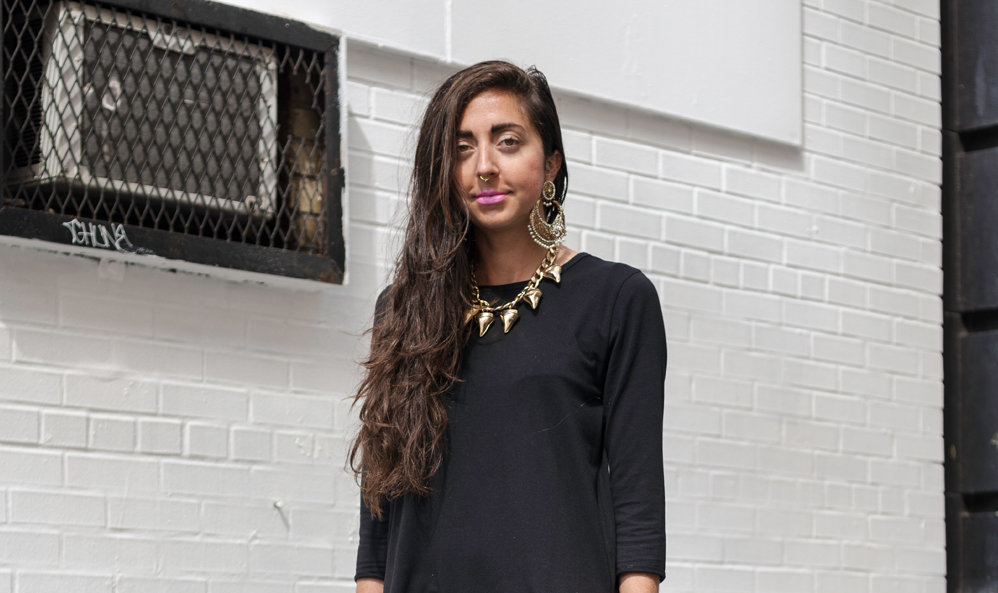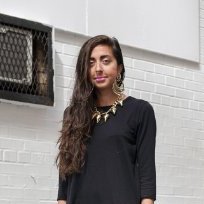
Paula Rosine Long on creating social impact in the world of fashion.
Fashion can have a bad reputation, but people will buy beautiful things no matter what. The challenge is to channel that to do some good - to create things that look beautiful but also are also socially good.
Paula Rosine Long
Fashion is not traditionally seen as the kind of industry associated with social impact and making a difference, but Paula Rosine [Zine] Long believes that this is changing.
Her experience in fashion and her interest in social impact, in part a result of her time as a Gates Cambridge Scholar, has led her to work with social enterprises and non profits, looking at ways to turn what might be seen by some as superficial into something deeper and more socially progressive.
She says: “Fashion can have a bad reputation, but people will buy beautiful things no matter what. The challenge is to channel that to do some good – to create things that look beautiful but also are also socially good.”
Zine [2010] recently spoke about her career so far and the role Gates Cambridge played in it at a Gates Cambridge Speaker event in New York, organised by Cambridge in America and Gates Cambridge.
Zine’s interest in combining fashion and social impact started at an early age. As a teenager she and her brother set up a business recycling and painting furniture they found by the roadside. The two sold the furniture to raise money for health supplies for a community in Central America.
The Painting a New Picture venture was in part inspired by Zine’s family background.
Undergraduate years
Growing up in Carrboro in North Carolina, she was influenced by her father’s environmentalism and her mother’s social activism. Her mother had started an organisation in a school in North Carolina which partnered with a village in Nicaragua, raising money to pay for health supplies there. At Duke University, where she did her undergraduate degree, she initially chose to focus on science. However, she soon gravitated towards English, inspired by her English professor Tom Ferraro, and to philosophy. During her course she did two research projects, one on gender in literature and film and aesthetic philosophy, with a US and UK focus, and a second on gender in Middle Eastern literature.
During her time at Duke Zine spent a semester in Italy studying sculpture and painting, which burnished a growing interest in the visual arts. She also spent a semester in Jordan working in non-profit organisations specialising in women’s rights and special needs education. That experience and her parents’ Lebanese heritage, drew her towards Middle East Studies. She joined Duke’s Arab Society and took part in dance troupes performing traditional Palestinian and Lebanese dance forms.
At Duke she also co-founded an organisation called Peace or Pieces which fostered dialogue between Jews, Muslims, Arabs and Israelis and raised money for projects in the Middle East. “It was hugely influential on my work at Cambridge, hearing completely different narratives and histories, seeing how deep these went and looking at how these could be reconciled,” says Zine.
In her final year she became ill and was diagnosed with a tumour in her right lung. She had her lung removed and spent a year at home undergoing treatment and recovering. During that time she did her own research on Middle East Studies, particularly Palestinian culture and literature and taught herself to sew and make patterns.
She says her illness was in a way “liberating”. “It really clarified for me that life can be shorter than you expect and so you need to use your time to do what you feel passionately about,” she says.
Cambridge
Zine decided that Middle East Studies was where some of her passion lay and got in touch with Professor Yasir Suleiman at the University of Cambridge after reading his research. Her dialogue with him led to her applying to do an MPhil in Cambridge and for a Gates Cambridge Scholarship. She arrived at Cambridge in autumn 2010, having spent the summer doing a poetry and visual arts project in Lebanon, funded by a Duke arts award. During that time she wrote a book of poems and illustrated them with drawings inspired by illuminated manuscripts.
Within weeks of starting her MPhil Zine had altered the focus from Arab American writing to collective memory in relation to the writing and depiction of the Palestinian writer Edward Said. Zine also became interested in how collective memory manifested itself in a visual way in textiles. She says: “We store our culture and stories in different ways in the arts. I was interested in how I could bring these different things together. I moved from text to textiles.”
Having previously considered her interest in fashion and the visual arts as a hobby on the side of her other work, Zine began to consider a career in fashion with a focus on making a positive social impact.
She returned to the US to New York where she did an associate degree in fashion at Parsons School of Design. During that time she also tried to get a start-up off the ground which aimed to connect Syrian and Lebanese refugee women with textile skills with a global marketplace and provide additional skills training. She says the experience taught her a lot about start-ups, but she realised it was not the right time for the organisation because of the more pressing needs in Syria.
Zine then dedicated herself to building her knowledge of the fashion industry. She says her academic background helped her to look for patterns in cultural trends and to analyse ideas. “For me good design is about emotional impact and cultural and historical associations. They all play into the creative process,” she says.
While she was at Parsons she was working the whole time, including as a fashion journalist and she started freelancing for designers such as Tommy Hilfiger.
Fashion industry
After graduating, Zine worked for Geoffrey Mac, a small edgy company which did a lot of costume design for celebrities such as Nicki Minaj. “Geoffrey pushed my technical skills and supported me to think outside the box,” she says. Zine attended a 3D printing exhibition and taught herself 3D modelling. That led her to create 3D jewelry designs that included a collection of silicone jewellery in just two weeks for Geoffrey Mac to show at Fashion Week. It was the first time she had designed jewellery professionally.
Zine then moved from Geoffrey Mac to Kate Spade. While she was there she started designing her own jewellery on the side for a number of clients, including the Clarity Project, an ethical diamond project in Sierra Leone. During her time with Kate Spade the firm also launched the On Purpose programme, a social enterprise which trains Rwandan women as artisans and helps them to sell their products, and both projects showed Zine that she could do something socially impactful in fashion.
After leaving Kate Spade she specialised in jewellery design and made her own line in 3D printed full-colour sandstone, which she believes is the first line of jewellery in this material. She also worked for FEED who raise money to feed vulnerable children around the world and she worked for a while in fast fashion before deciding it was not for her. She is now working for Talbots, focusing on more longer term trends and creating quality products that last. “There is a movement in fashion towards less waste and greater sustainability,” says Zine.
She is now looking to combine her fashion knowledge with social justice issues, is also editing novels and creating a lot of 3D sculpted artworks.
Zine says being a Gates Cambridge Scholar had a huge impact on how her career has progressed and exposed her to a wide array of perspectives and ideas. Many of her closest friends are Gates Cambridge Scholars, even now. “As both a personal and professional network is has been wonderful,” she says. “I have a group of Gates friends who are doing really inspiring things all the time which have a major social impact. You are influenced by the people around you. Being surrounded by a group which is passionately engaged and socially conscious is very motivating.”

Paula Long
- Alumni
- United States
- 2010 MPhil Asian and Middle Eastern Studies
- Newnham College
I did my MPhil in Middle Eastern Studies with Prof. Yasif Suleiman as a Gates Scholar. Previous to this, I did my undergraduate at Duke University, and I worked in the Middle East as an artist in residence and at various social enterprises and startups. I am now a fashion designer in New York City, especially passionate about ethical, sustainable design and designing for social enterprises, as well as exploring the possibilities of new fashion technologies. I hope to eventually work on a design-based social enterprise in the MENA region to marry my passions and interests.












